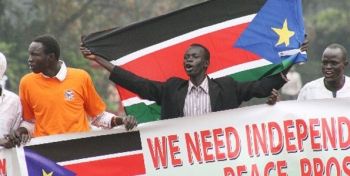
Publisher:
Bonnie King
CONTACT:
Newsroom@Salem-news.com
Advertising:
Adsales@Salem-news.com

~Truth~
~Justice~
~Peace~
TJP
Sep-07-2010 23:14

 TweetFollow @OregonNews
TweetFollow @OregonNews
Expectations & Tensions run high as Sudan's Referendum Approaches
Alysha Atma Salem-News.com African Affairs CorrespondentThose living on the demarcation border and internally displaced (IDP) fear the results will harden the border, threatening their livelihood and security.
 Courtesy: Daily Nation |
(PORTLAND, Ore.) - The National Congress Party (NCP) of the North and the Government of South Sudan (GOSS) must work together on a framework for cross-border arrangements and movement; including repatriation of internally displaced people (IDP) and border demarcation.
The agreement must benefit the people who fear a return to conflict, loss of citizenship and livelihoods. Regardless of the referendum outcome, both should agree on a framework that addresses citizenship, migration, economic activity and security.
“A solution to the border is not only about drawing a line, but about defining the nature and management of that border and the future relations of communities on both sides”, says Zach Vertin, Crisis Group’s Horn of Africa Analyst.
Countless people fled to the north during the 20 year civil war. “Most of south Sudan is underdeveloped and extremely poor. Aid agencies are already taxed with making sure that the current number of returning displaced persons and refugees receive sufficient support to integrate into southern communities. International involvement is essential,” said Joel Charny, Vice President of Refugees International.
The GOSS program entitled “Come Home to Choose,” will urge 1.5 million displaced southerners in the North to return to the South. The anticipation of the GOSS is to complete the mass reparation before the January 2011 referendum. Refugees International (RI) was recently in Sudan on a mission looking specifically at the issue of displaced southerners in Khartoum, they are urging the GOSS to ensure the return is completed on a strictly volunteer basis.
“Humanitarian objectives should remain the goal of the repatriation process. If people genuinely want to return home, that is their right. But the Government of Southern Sudan must work together with international organizations to ensure the process is voluntary, and people should not be moved until there are enough emergency resources to receive them, such as food and temporary shelter,” said Joel Charny. "People should not be moved, to be used as a political tool during the referendum," he continued.
Those living on the demarcation border and internally displaced (IDP) fear the results will harden the border, threatening their livelihood and security. Expectations, emotions and tensions are high in advance of the January 2011 referendum, in which Southern Sudanese will decide whether to secede from the North.
RI released a field report in June detailing the conditions that must be acknowledged and addressed in the repatriation.1 The report points to the loss of citizenship, violence and vulnerability that the southerners in North face if an independent South results. An organized repatriation may be one component in the move toward helping protect this community as the referendum approaches.
The Comprehensive Peace Agreement (CPA) called for the border between the North and South to be defined within six months of signing. Five years later, the task remains incomplete. International Crisis Group (ICG) told Salem-News.com “The deliberations of the technical body tasked to draw the line have been exhausted and its work plagued by a poisoned atmosphere. While most of the border has been agreed, five specific areas are disputed on technical grounds; still others remain contested in the public arena.”
ICG recently released an analyses describing how the undefined borders have hindered the implementation of the 2005 CPA. The heightened anxiety along the border has fuelled mistrust between the North and South. The country’s oil resources are concentrated in these areas along the potential border, the political and economic implications of the demarcation line have been amplified, and some border areas remain dangerously militarized.
“The ideal post-referendum scenario is one in which the parties and their border constituencies can achieve the softest border possible. If necessary, a joint monitoring mechanism may help to safeguard that border, as well as the rights and responsibilities of the people on both sides”, says E.J. Hogendoorn, Crisis Group’s Acting Africa Program Director. “Progress on these fronts will help to prevent Sudan, whether as one country or two, from falling back into conflict”.
- *Sources: International Crisis Group
- *Sources: Refugees International
- [1] refugeesinternational.org/policy/field-report/sudan-preventing-violence-and-statelessness-referendum-approaches
- [2] Sudan: Defining the North-South Border
 Alysha Atma spends many hours working on projects that support and benefit the beleaguered people of African nations who spend way too much time off the western media's radar. This writer explains that she is a culmination of all her experiences, most importantly knowledge she says, and all that she still needs to learn; lessons of love, laughter and the extraordinary giving of both young and old. She says she has the enormous fortune of learning from the best; every person around her, and the amazing strength and fortitude of those she has never met but will always strive to listen to. "I continue to work and write because I believe in the power of community and the power of one, both contradictory to each other and yet can move together in a very powerful way. I feel a responsibility to use my place, freedoms and connections here in the US to stand up and yell for those who need my voice and actions. I have seen such strength in my fellow humans that I cannot even begin to comprehend, they have traveled distances, have gone without food, water, shelter and safety for days and weeks at a time. I have a responsibility as a fellow human to put our common humanity before anything else. Everyone deserves to look towards tomorrow, to dream of a safe future and to have a peaceful present." You can write to Alysha Atma at: alysha.atma@gmail.com
Alysha Atma spends many hours working on projects that support and benefit the beleaguered people of African nations who spend way too much time off the western media's radar. This writer explains that she is a culmination of all her experiences, most importantly knowledge she says, and all that she still needs to learn; lessons of love, laughter and the extraordinary giving of both young and old. She says she has the enormous fortune of learning from the best; every person around her, and the amazing strength and fortitude of those she has never met but will always strive to listen to. "I continue to work and write because I believe in the power of community and the power of one, both contradictory to each other and yet can move together in a very powerful way. I feel a responsibility to use my place, freedoms and connections here in the US to stand up and yell for those who need my voice and actions. I have seen such strength in my fellow humans that I cannot even begin to comprehend, they have traveled distances, have gone without food, water, shelter and safety for days and weeks at a time. I have a responsibility as a fellow human to put our common humanity before anything else. Everyone deserves to look towards tomorrow, to dream of a safe future and to have a peaceful present." You can write to Alysha Atma at: alysha.atma@gmail.com
Articles for September 6, 2010 | Articles for September 7, 2010 | Articles for September 8, 2010

Quick Links
DINING
Willamette UniversityGoudy Commons Cafe
Dine on the Queen
Willamette Queen Sternwheeler
MUST SEE SALEM
Oregon Capitol ToursCapitol History Gateway
Willamette River Ride
Willamette Queen Sternwheeler
Historic Home Tours:
Deepwood Museum
The Bush House
Gaiety Hollow Garden
AUCTIONS - APPRAISALS
Auction Masters & AppraisalsCONSTRUCTION SERVICES
Roofing and ContractingSheridan, Ore.
ONLINE SHOPPING
Special Occasion DressesAdvertise with Salem-News
Contact:AdSales@Salem-News.com

Salem-News.com:
googlec507860f6901db00.html

Terms of Service | Privacy Policy
All comments and messages are approved by people and self promotional links or unacceptable comments are denied.
[Return to Top]
©2025 Salem-News.com. All opinions expressed in this article are those of the author and do not necessarily reflect those of Salem-News.com.